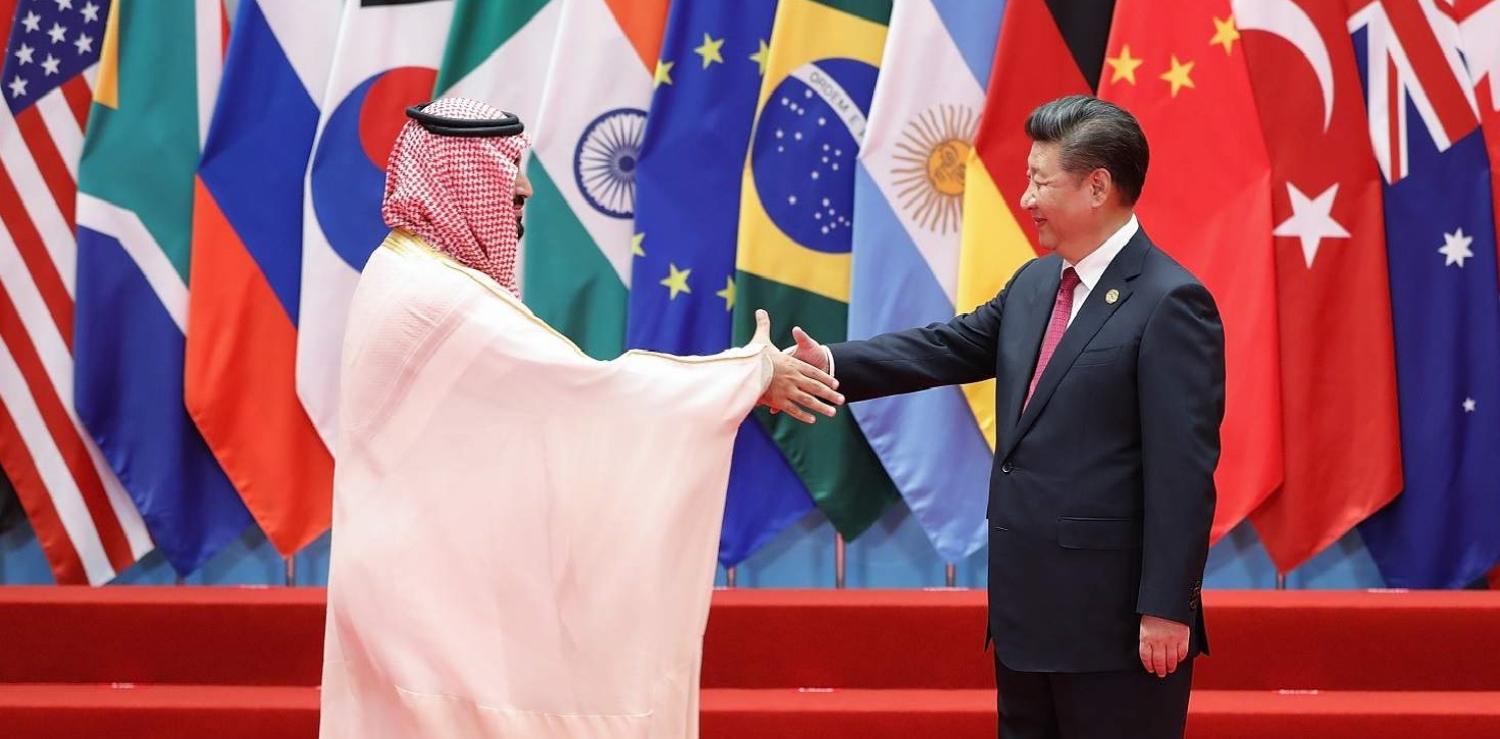As the relationship between longtime allies Saudi Arabia and the United States becomes increasingly strained, China could cultivate a stronger bond with the Middle Eastern kingdom. In a recent phone call between Saudi Crown Prince Mohammed bin Salman (colloquially known as MBS) and China’s President Xi Jinping, the two leaders reaffirmed China would continue to buy oil from Saudi Arabia, and discussed future avenues of cooperation in technology, trade and infrastructure.
Saudi Arabia is China’s largest supplier of oil, followed by Russia. As sanctions over the invasion of Ukraine make Russian oil difficult to procure, Beijing must maintain a good relationship with its oil-rich Arab supplier. Facing economic problems at home and an increasingly unyielding West, China’s energy security has taken on greater importance, especially as the country attempts to wean itself off coal.
In March, the Wall Street Journal reported that discussions were underway for Saudi Arabia to sell oil to China in yuan rather than US dollars.
For most of their diplomatic history, the relationship between China and Saudi Arabia has been purely transactional – oil in exchange for money and weapons. Saudi Arabia was in fact one of the last Middle Eastern nations to recognise the Chinese Communist Party as the government of China in 1990. In recent years, that has changed as both countries seek to extend their mutual ties. China is an enticing potential ally for Saudi Arabia. It has a strong reputation for ostensibly not interfering in the domestic affairs of other countries, with similar views on human rights violations. As an example, Saudi Arabia signed a 2019 letter to the United Nations Human Rights Council defending China’s actions in Xinjiang, with the kingdom currently set to deport several Uighurs back to China.
The war in Ukraine has possibly pushed both countries to expedite their closer friendship. In March, the Wall Street Journal reported that discussions were underway for Saudi Arabia to sell oil to China in yuan rather than US dollars. As China buys more than 25 per cent of Saudi oil exports, such a change would greatly benefit the Chinese currency. Both nations could expand the yuan as a workaround to the US dollar’s supremacy, bypassing sanctions with Russia.

This is not the type of relationship MBS currently enjoys with other allies, where his ambition to modernise the kingdom while ensuring complete control as monarch are difficult to calibrate. The US government and public have become increasingly outraged by the kingdom’s human rights violations and its role in Yemen’s civil war and famine. Last year, in a meeting between MBS and US National Security Adviser Jake Sullivan, the crown prince is alleged to have shouted at Sullivan after the adviser brought up the death of Saudi journalist Jamal Khashoggi, who was killed inside the Saudi consulate in Istanbul in 2018.
The strains have become more apparent in the wake of the Russian invasion of Ukraine. Saudi Arabia has refused US requests to pump more oil, leading to higher gas prices in the West and the need for Europe to continue using Russian oil. Although Saudi Arabia has called for a political settlement over the Russian invasion, it has not condemned it. Despite public claims by diplomats that the relationship is as strong as ever, it is evident that both countries are tiring of each other. Ergo, Saudi Arabia has sought out a new and powerful partner, one that allows the crown prince to fulfil his dream of becoming a modern Peter the Great.
A Trump return or a Republican of similar nature could see Saudi Arabia revert to being a key US ally.
In this endeavour, China fits the bill. Its Belt and Road Initiative is heavily integrated with Saudi Arabia, the kingdom representing one of the top three destinations for Chinese construction projects. Saudi’s own major strategic initiative, Vision 2030, aimed at reducing its dependence on oil and diversifying its economy, aligns easily with the BRI. Chinese construction companies have already begun building infrastructure in Saudi Arabia, including the “Green Dragon” metro rail line in Mecca. The Chinese telecommunications company Huawei is also heavily involved in Saudi Arabia, building cloud facilities to bring internet to remote areas.
However, China and Saudi Arabia’s future friendship is not certain. The crown prince may be hedging his bets in case Donald Trump cannot retake the White House in 2024. MBS has kept close ties with Trump, recently making a $2 billion investment in Jared Kushner’s real estate venture. A Trump return or a Republican of similar nature could see Saudi Arabia revert to being a key US ally. Current moves by MBS, such as the potential yuan oil deal, could be feints by the crown prince to entice the US to ease its criticisms.
In Xi’s phone call with MBS, the Chinese president stressed how important the relationship between the countries will become “with the change in the international and regional situations”. The Russian invasion of Ukraine has created a seismic shift of consciousness in the West. The resulting economic sanctions by the United States on Russia, cutting them off from the international economy, has had significant implications for countries such as Saudi Arabia. When the allure of oil no longer wipes away concerns about human rights, oil-rich nations may have to look elsewhere for support.

